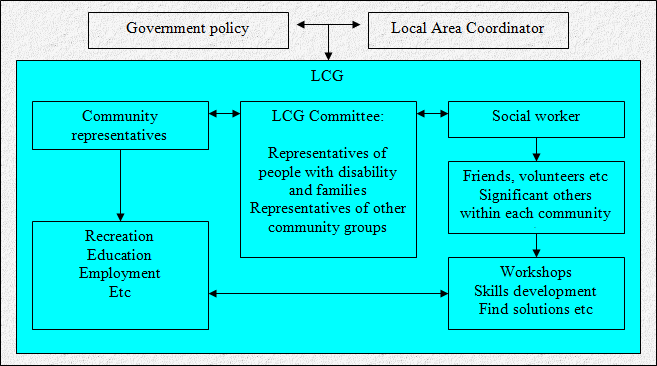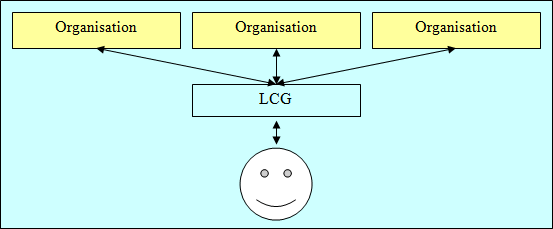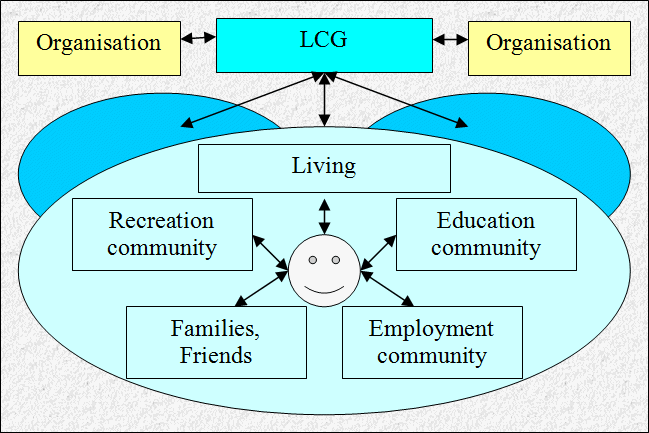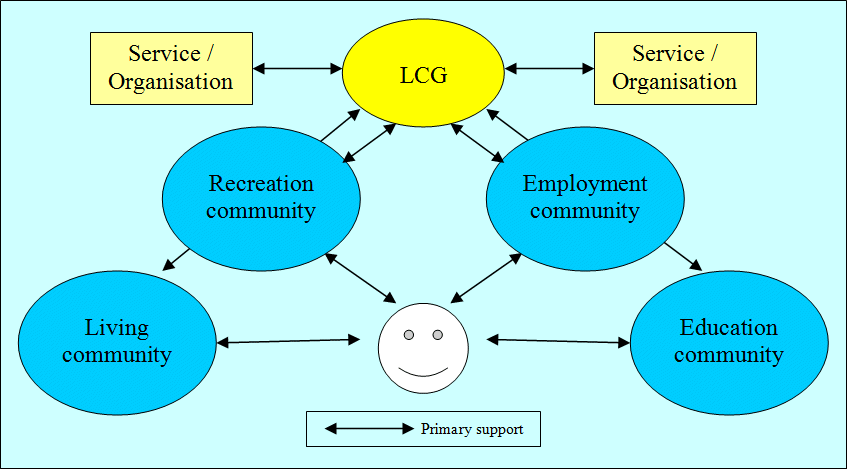A local community
group (LCG)
Contents
A community group or a
community
service? (Top)
A community group is where a number of people get together for a common
purpose of interest. The group may provide support for each other, or
support others that need some help in providing for their own needs.
They share skills and resources to achive the goals of the group. There
is a sense of purpose and achievement in the project, All members
benifit in participating in the activity. There is a value in being a
part of the group. While the group may provide a valued role, it is
limited by the skills and resources that can be shared within the
group. As a result the members may look to a business or service to
provide a skill or resource that is not available within the group. A
service is a business or organisation that provides specalised skills
and resources to a community that are are not available within that
community. The service is structured or organised around a need. This
need can be transportation, home maintenance or anything that is not
available to a person or a group of people. Services such as
electricty, water, gas, telephone etc were originally (and still are in
some areas) the responsibility of the person (they were not provided as
a community service). The trend today is to encourage individuals
(through subsidies or bonuses) to provide for their own needs as much
as possible rather that relying on the service. This strategy reduces
excessive demand on existing services that are unable, through various
reasons, to keep up with population growths.
Originally human services were the providence of a family or group.
They managed as best as they could. Over a period of time human
services became so specialised within each area of care that they have
become service industries within their own right. These services now
provide important roles within society. They have the specialised
skills and resources that are not available within the wider community.
These days the trend is to shift the support mechanisims from congreate
care to indivualised care. While the settings may have changed, these
mechanisams are still there, where the support is provided by a service
that is specialised within a particular area of care. As a result we
see a multitude of services that support people in a vartety of
settings that most suits the persons needs, as well as the needs of the
wider communities that these services are a part of. People with high
support needs that can not be supported within their community are
still supported by a service that specialises in a paticular area of
care.
I feel that a time where people with high support needs are are
supported within their own communities will never return. We can change
the settings and provide more appropriate supports where these groups
have more opportunity to be more involved in local community
activities, however, these groups will always have the support
structures and mechanisms as a part of their lives. The way the support
is provided is determined by the society in wich we live, as well as
government policy and practice. This does not mean that a community can
not be a part of the process. Who knows what will happen in the future.
Will societies be the same as they are now in 100 years time? Will
communities as we know them today still exist? Somehow I feel that the
answers to both questions will be NO.
Whatever the future is, the reality is that we are living in the
present and it is up to us to determine the future. Communities are
changing in the sense that they are no longer bound by geographical
locations. However, the idea of community is probally more important
than at any other time. Communities provide the way we socialise with
each other. They provide a way to share experiences, and relationships.
Having a local community support network can be the first step towards
independence.
Rather than building new communities around people with disability, we
should be building existing communities that have the skills, resources
and valued roles, where people with disability are a part of their
community.
A local community group
(Top)
A better description of a group of
stake holders that get together would probably be "local area group" or
"a community network of support".
Representatives of the local businesses, recreational groups, youth
groups, educational institutions and government departments get
together to find the best solutions to enable people with high support
needs to participate within each community that they wish to
participate in. The community may be a local community or a part of a
service provider who specialises in a particular area of care. The idea
is to involve other local community services as much as possible in the
support.
This has the advantages of ...
... all stake holders are
a part of the
process
... various issues can be discussed and solutions can be found within
each community
... communities have the opportunity to become more familiar with these
groups
... new patterns of behaviors are introduced into the community
... the community learns new skills
... existing community resources are used more effectively
... can create networks within each community
... is flexible in providing for the individual needs of each person,
as well as each community that is most appropriate for the person
... provides the tools that help each community help themselves:
policies, funding, training can be coordinated through a local group.
... services that specialise in a particular area of care can be
employed to suit the needs of the person and the community.

Structure of
LCG shows
community
stakeholders that support direct intervention in the care of people
with high support needs.
Various activities are coordinated through the LCG with
the
support of
the various organisations that provide specialist services.
The LCG is accountable to the various government policies
and
regulations in respect to performance and service delivery.
Note: this service model is
based on CLAN WA
(Community Link And Network)
The Local Area Coordinator ...
... acts as a government
representative
within a number of groups within an area.
... acts as a link between the various local, state and federal
government departments: disability, social security, housing, business,
employment,
aged care, child
care, community services etc.
... acts as an advocate/lobbyist on behalf of the groups about issues
in government policy and processes.
... coordinates the activities of various services and organisations:
disability, businesses, educational, recreational etc.
... coordinates the activities of the group with other community groups
within an area.
... acts as an arbitrator/mediator where issues arise within the group.
... provides direction for the group.
LCG: provides a support network for
people with high support
needs with other members of each community (living, recreation,
education and
employment). The LCG would provide training, workshops etc. for
families,
friends to find solutions for community participation.
People
with
disability, families, and friends and significant
others within
each community:
would have the networks and skills to find the most appropriate support
within
each community. Rather than each organisation
supporting a
person or group
of people, the LCG would provide that role. The LCG would be able to
access
each service that is appropriate the needs of the person as well as the
needs
of each community that the person wishes to be a part of.

Each
organisation would have a supportive role in providing for the needs of
people
with disability.
The LCG
provides the skills and
resources for each community to support a person or group within that
community.
A community could be a part of an organisation or service
provider, or
within the wider community.
The organisation would also provide the skills and
resources
that are
not available within the wider community.
Services would be coordinated by the LCG.
The LCG would be made up of a committee of local community members with
a social worker that supports people with high support needs and their
families in developing valued relationships within their community. The
community has the opportunity to become more actively engaged in
supporting people with high
support
needs and their families through the various activities of the LCG. Having a local
support network can be the first step
towards independence.

<------->
Direct support provided by family, friends (volunteers, co-workers
etc.)
and community
networks within each community (home, recreation,
education and employment).
<------->
Staff or specialised service employed by the
person,
family or LCG to provide specialised
care that is not available within
the local community network, e.g. medical, skills development,
transport.
The local community has access to special skills provided by
the
respective organisation.
The various activities of
each community (education,
living/recreational and
employment) would be coordinated through
the LCG,
which is supported by the organisations that specialised in a
particular area of care.
Living: would be coordinated through the LCG, where the most
appropriate accommodation for the person and family would be found.
Medical needs: could be provided within the respective community or
provided by an organisation that specialises in that area of care.
Nursing agencies etc. could be employed or contracted to provide any
special support. Transport: could be provided within the respective
community or
contracted through Swan taxies etc.
The needs of the person
Vs the needs
of the community (Top)
From:
People
with low to medium support needs are supported by a service or
organisation in participating within each community.
Where a community does
not have the
skills and resources to support the person, new communities are created
within the service arena to fulfill those needs.
To:
Rather
than supporting the person, the LCG supports the community, where the
community has the skills and resources to provide for the needs of its
members.
When providing the most
appropriate
care for people with high support
needs ...
1) The community is not
where the
person is living, but where the person participates, shares experiences
and has valued relationships with others.
2) People with high support needs (severe disability, aged
etc.)
will always need support structures as a part of their lives.
3) The amount of participation in a community (living, education,
employment or recreation) is directly related to the skills and
resources of the person, and, the skills and resources of the community
that the person wishes to participate in.
4) Institutions are going to be around in one form or another
whether we like it or not, It is the way that they are used that is the
problem.
5) The institutions of a society towards a particular group determine
the way the group participates in society.
6) The institutions of a particular government department,
organisation, profession or service define the way the person is
supported within that society.
7) Facilities that support people with high support needs do
not
need to be the nursing homes or prisons in the sense that they are
today, but can become warm inviting community places that offer a range
of services to the community, as well as be a part of the wider
community.
8) People with high support needs are a minority group in our
society, and will have the same problems as other minority groups in
being a part of society.











